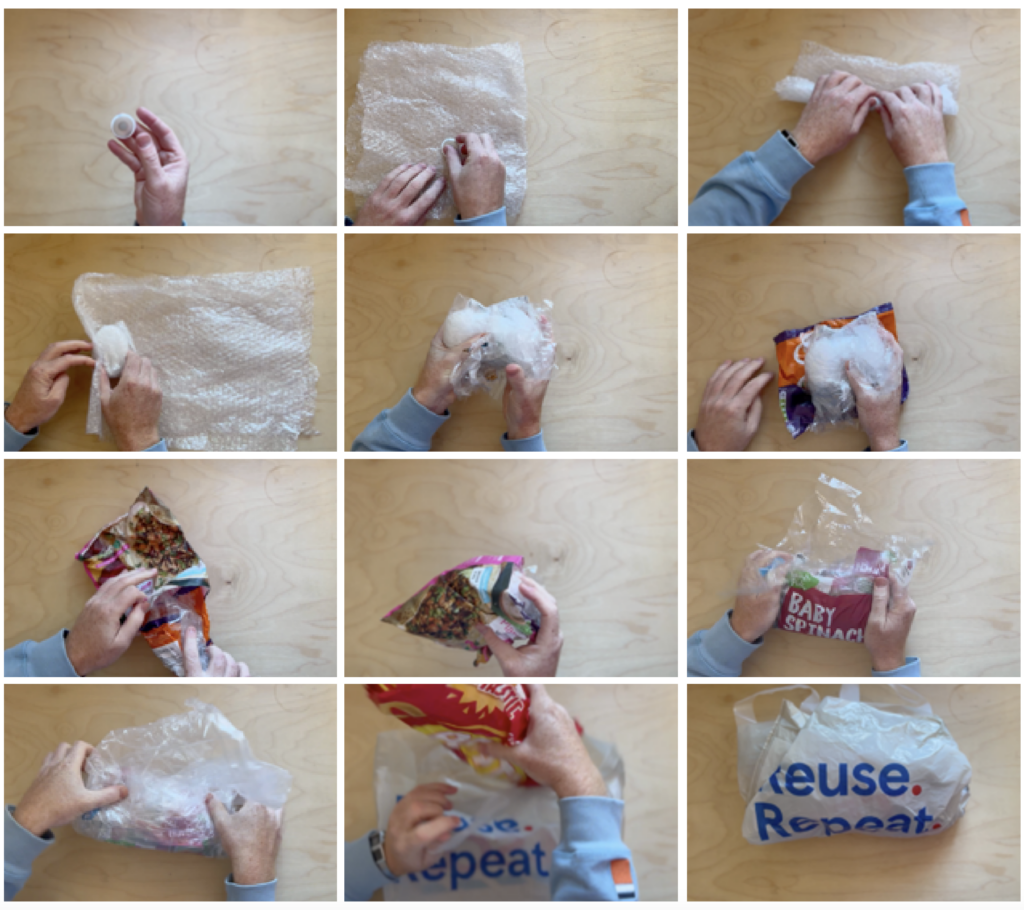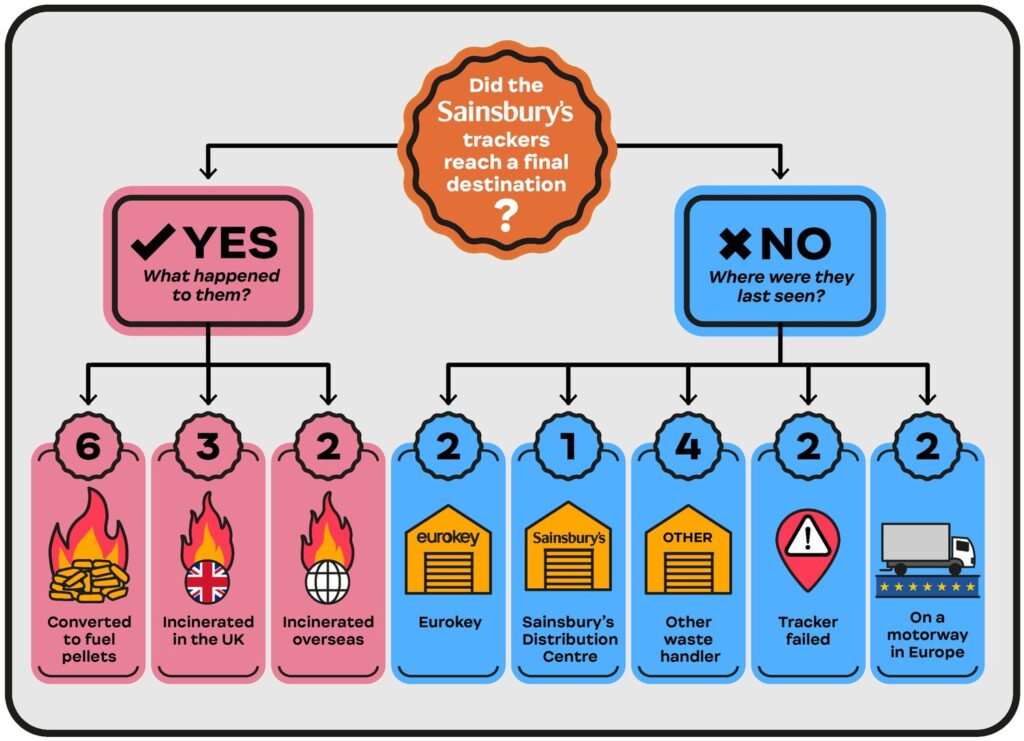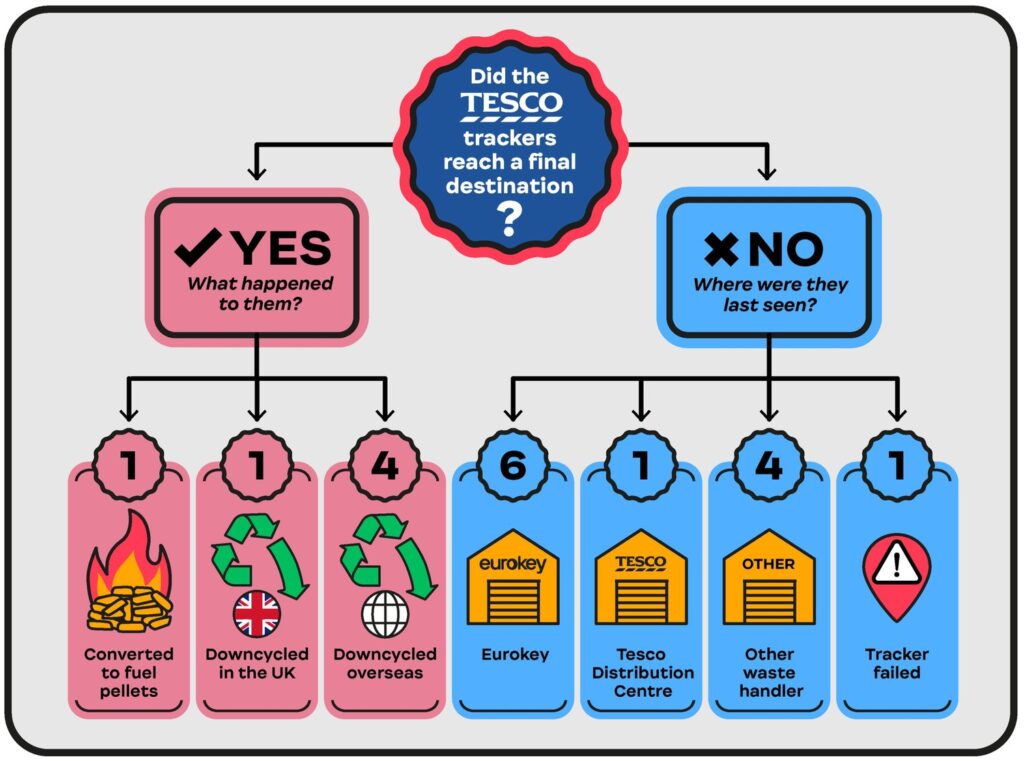Tesco, Sainsbury’s ‘Misled’ Consumers By Burning Most of the Soft Plastic They Pledged to Recycle
7 Mins Read
The take-back schemes run by UK supermarkets to recycle soft plastics have misled consumers, with 70% of this waste being burned instead, an investigation has found.
Tesco and Sainsbury’s – the UK’s two largest retailers – are being accused of misleading shoppers over their plastic recycling schemes, after campaigners inserted trackers inside soft plastic packages.
Between July 2023 and 2024, members of campaign group Everyday Plastic placed Apple AirTags in 40 bundles of soft plastic collected at Tesco and Sainsbury’s stores across England, as part of the retailers’ take-back schemes.
But instead of recycling these soft plastics – as they had pledged – 70% of them were actually burned. The rest ended up at recycling facilities that downcycle them into lower-value products (like bin bags, carrier bags, and composite timber boards), and 80% of these were sent to recycling facilities abroad, mainly to Turkey.
This takes advantage of consumers’ goodwill and misleads them about the environmental impact of soft plastics, the campaigners argue. “Our trackers reveal the hard truth about soft plastic recycling schemes at supermarkets – soft plastic packaging is not getting recycled,” said Alison Colclough, research director at Everyday Plastic, which carried out the investigation with the Environmental Investigation Agency.
“Supermarkets, waste companies and the government acknowledge that there are significant challenges to recycling soft plastic,” she added. “Our tracker investigation supports these claims and shows that soft plastic is extremely difficult, if not impossible, to recycle at scale.”

Why recycling soft plastics is a problem for supermarkets
To tackle their growing plastic footprint, major supermarkets in the UK began their take-back schemes in 2021, encouraging consumers to collect their plastic packaging waste and bring it to the store for recycling. As of October 2022, this initiative has been rolled out in over 6,000 locations, including those of Tesco and Sainsbury’s, which command 43% of the country’s grocery share.
Plastic, which is petroleum-based, and terrible for the planet and human health. It takes anywhere between 20 and 500 years to decompose, and producing it generates more emissions than the entire aviation sector. But we’re on course to manufacture three times as much plastic by 2060 – and emissions from this sector are set to take up a fifth of the global carbon budget by mid-century.
But soft plastics – from the shrink wrap on cucumbers, to salad bags and packaging for Quorn – are the most concerning form of plastic packaging, with 215 billion new items placed in the UK market in 2023 alone. At those rates, the country’s recycling capacity would need to increase by 350%.
Tesco has called soft plastic an “important part of our packaging portfolio” that helps preserve food and prevent waste (although that claim is shaky at best). Sainsbury’s has echoed this point by noting that it “helps us deliver fresh, undamaged produce”, but it acknowledged that it “can have a negative impact on our planet”.
The problem, though, is that soft plastics are notoriously hard to recycle, especially since the end recycling market in the UK is limited. In 2022, only 7% of soft plastics placed on the domestic market were collected for kerbside recycling, which is unsurprising given that 88% of local authorities don’t collect soft plastics at the kerbside for recycling.
Even if soft plastics are theoretically recyclable, the UK’s infrastructure only has the ability to recycle a quarter of the soft plastic placed on the market. This is why it sends most of its plastic waste offshore, making it the fourth-largest exporter of these materials. Last year, it exported 568,000 tonnes of plastic waste, a 10% increase annually, a quarter of which went to Turkey, and a fifth to the Netherlands.
“The take-back schemes are being presented as a solution, which is diverting attention from the main issue that can’t be overlooked: far too much unnecessary plastic packaging is being produced,” said Colclough.
Tesco and Sainsbury’s respond to investigation

Of the 40 AirTags, 22 ended up at front-of-store collection points at Sainsbury’s stores – but only 11 reached a final destination. Six of these packaging bundles were turned into fuel pellets to be used in energy production for furnaces and kilns, while five were incinerated for energy recovery. Neither of these measures is considered a form of recycling.
As for the ones that didn’t get to a final destination, they were scattered around waste transfer stores, a Sainsbury’s distribution centre, reprocessing facilities, and a motorway in Europe – and two never left the supermarket.
At Tesco, only six of the 18 trackers ended up at a final destination, with one bundle being converted to fuel pellets, and five sent to facilities that repurpose plastic waste into lower-value products. This practice is called downcycling, and the repurposed items are themselves difficult to recycle or dispose of at end of life.
“We believe that none of our tracked bundles of soft plastic whose final destination is known, ended up at a closed-loop recycling facility,” the report suggests. The remaining dozen packages were last seen at repurposing facilities, a Tesco distribution centre, and waste handling plants.

“We have a clear plan to remove packaging wherever possible, and reducing, reusing and recycling it where we can’t,” a Tesco spokesperson said. “Given the challenges of collecting soft plastics at kerbside, we have soft plastics collection points in our stores for customers.
“Where it is not possible to recycle the collected plastic, we put it to alternative uses to avoid these materials going to landfill, for example using it for energy recovery. We know there is a lot more progress to be made, and the infrastructure to recycle soft plastics at scale in the UK and the EU still has a way to go. We are committed to working constructively with the industry and government to find new solutions for all materials, including those previously considered waste.”
A representative for Sainsbury’s added: “We’re always seeking ways to positively manage the end-of-life of our packaging. Our ‘return to store recycling scheme’ provides the opportunity to recycle more soft plastic until kerbside collection becomes available in 2026-27.
“We collect a small volume of flexible plastic overall in-store. The majority is in good condition and so is recycled. However, when materials are soiled or damaged, then they may need to be converted for energy, which is managed by our supplier.”
Supermarkets and government urged to back global plastics treaty

The investigation has thrown fresh doubt over supermarkets’ recycling schemes. A 2021 survey revealed that almost all Brits felt recycling soft plastics would be good (96%) and worthwhile (91%). And in the last year, awareness about take-back schemes has grown, from 31% of citizens in 2023 to 48% now.
“There is a huge gap between what consumers are told about recycling and the shocking reality,” said Katie-Scarlett Wetherall, a lawyer at ClientEarth, which has published a legal briefing warning that soft plastic recycling claims are misleading. “Consumer protection authorities such as the UK Competition and Markets Authority have grounds to legally challenge these claims. Supermarkets, fast-moving consumer goods companies and the packaging sector must be alive to this greenwashing risk.”
Both Sainsbury’s and Tesco are part of the UK Plastics Pact, whose members are responsible for 75% of consumer plastic packaging, and have pledged to recycle or compost 70% of packaging while eliminating single-use plastics by 2025. This is an effort coordinated by UK waste reduction charity WRAP.
Helen Bird, WRAP’s head of materials systems transformation, defended the take-back schemes, noting their importance before kerbside soft plastic recycling comes into force in 2028: “While not perfect, these have acted as an important catalyst for crucial investment in UK recycling infrastructure and end markets and instilled new habits in people to separate bags and wrapping for recycling.”
Next month, global leaders will convene in the final negotiations for the UN’s plastics treaty, which is calling for an end to plastic pollution and a 40% reduction in production by 2040. Everyday Plastic is now asking Sainsbury’s and Tesco to publicly push the UK to support the treaty.
It’s also urging the government to set legally binding targets to cut single-use plastic, remove plastic packaging from unprocessed fruits and vegetables by 2030, ban plastic waste exports by 2027, suspend new incineration activity, prevent chemical recycling as a plastic treatment option, and provide financial incentives to adopt reuse systems.
Meanwhile, supermarkets must significantly reduce their single-use, non-essential packaging, stop exporting collected soft plastic waste, and be transparent with consumers about the challenges of recycling these materials.



